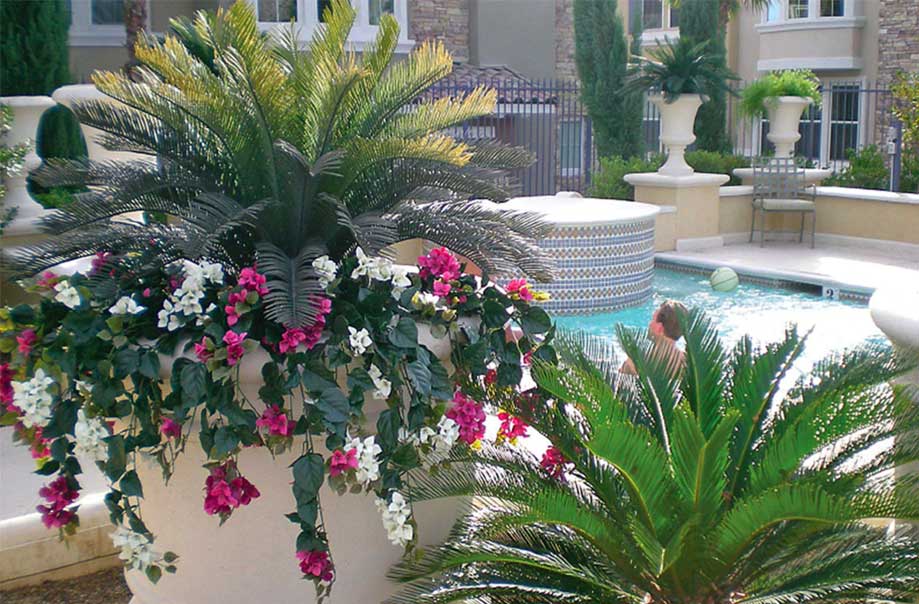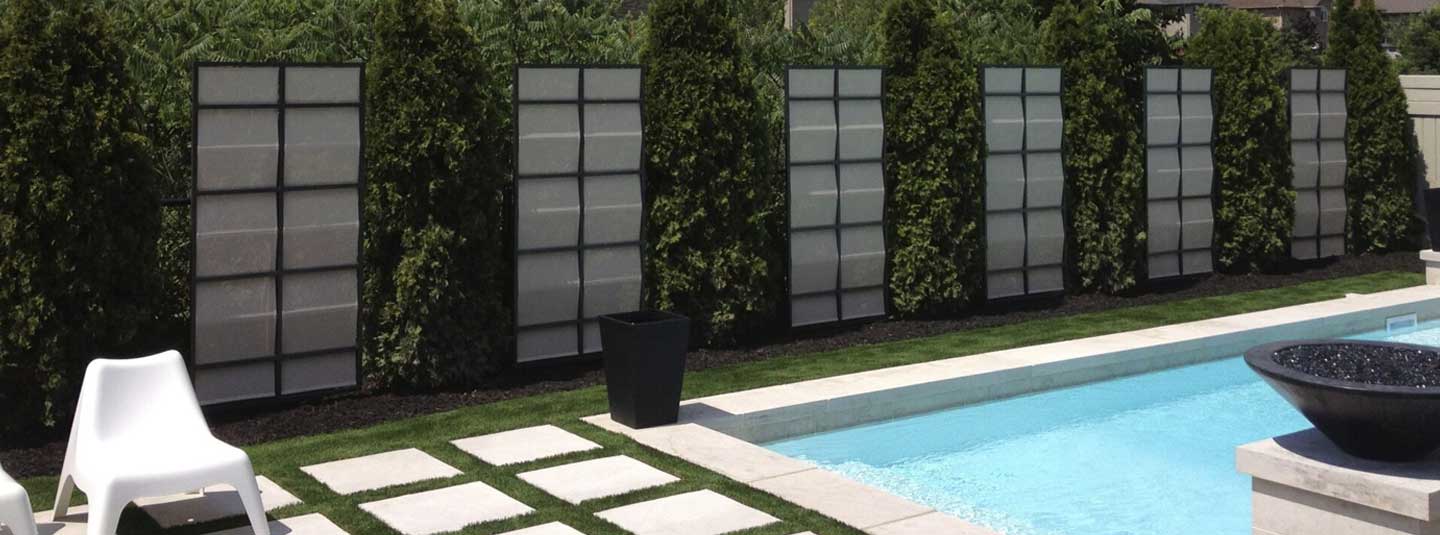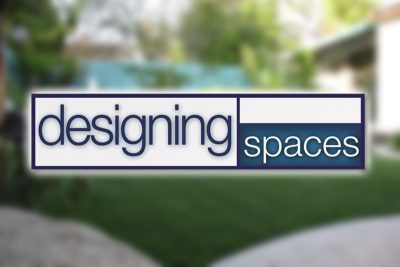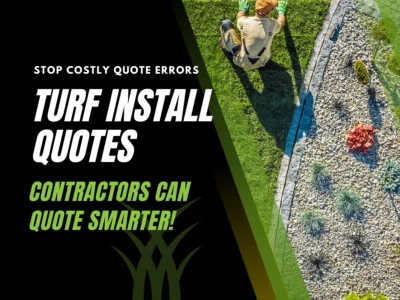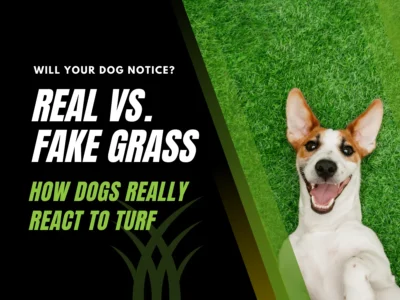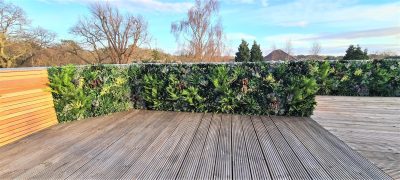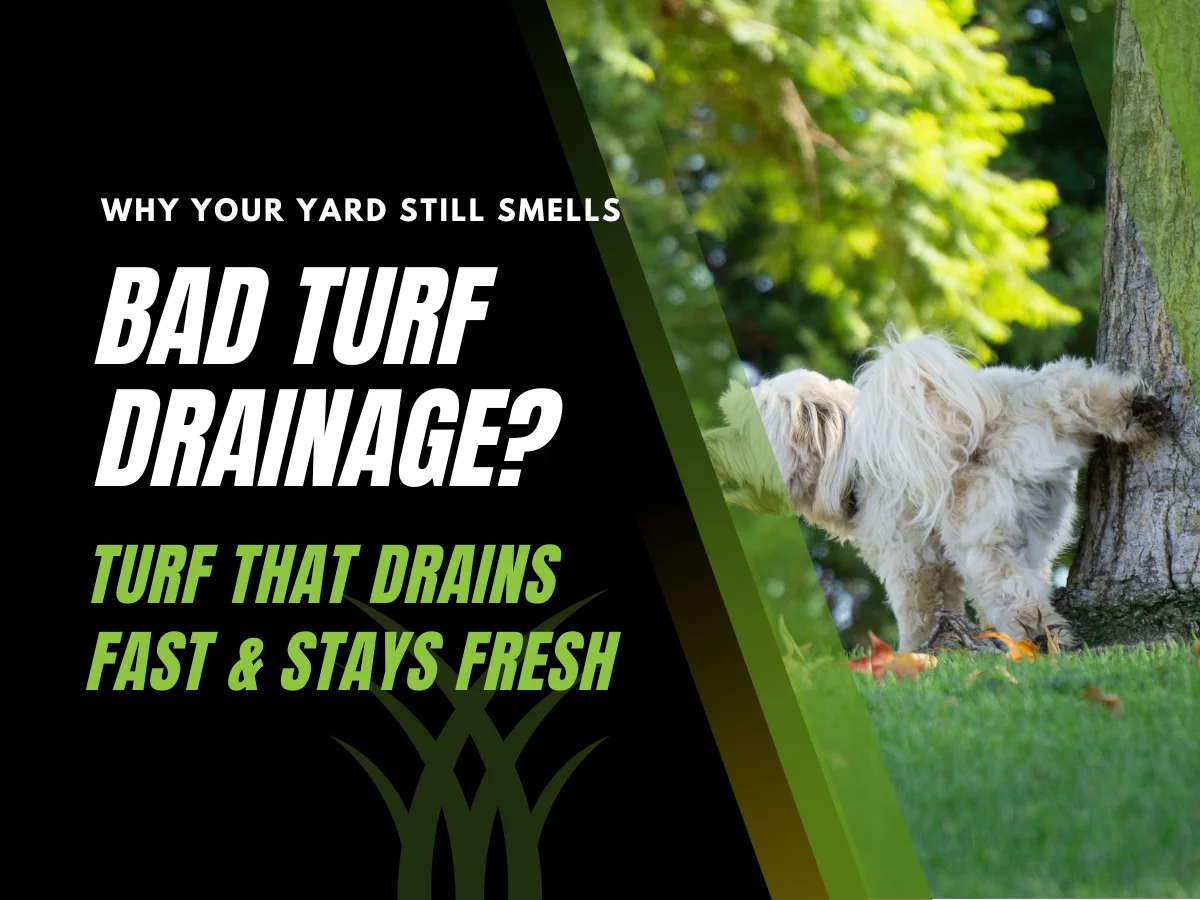When we’re thinking about switching to artificial grass for your pet, there’s one concern that always comes up: Will it actually drain? Or will it turn into a soggy, smelly mess that’s worse than natural grass?
Let’s set the record straight. Turf drainage isn’t only for convenience. Choose fast-draining turf for cleaner, odor-free yards that keep paws happy. It’s about odor, cleanliness, pet safety, and your peace of mind.
But not all turf systems are the same. Here’s what dog owners need to know before installing pet turf.
The Big Concern: Will Artificial Grass Drain for Dogs or Just Smell and Pool?
The biggest hesitation we hear from pet owners is: “But won’t the pee just sit there?”
That fear isn’t unfounded. Many turf products on the market struggle with artificial grass drainage for dogs, especially when infill is involved. On average, a medium-sized dog should pee about 14-28 ounces per day. Multiply that by two dogs, and your turf sees nearly 60 litres of liquid per month. Drainage matters.
But here’s the difference: most drainage issues aren’t caused by the turf. They’re caused by infill.
Infill is the sand or rubber material packed into turf to help the blades stand up. In pet settings, it becomes a sponge for urine, trapping odors and bacteria. It compacts over time, reducing airflow and blocking drainage altogether. The result? Puddling, squishiness, and that unmistakable smell after a hot day or a heavy rain.

With AGL’s infill-free turf, that problem doesn’t exist. Drainage isn’t blocked. Odors don’t linger. And cleanup is a breeze. That’s a major difference compared to typical artificial grass drainage systems that rely on infill.
4 Myths About Turf Drainage (Especially for Dog Owners)
Myth 1: All turf drains the same.
False. When it comes to artificial grass drainage for dogs, performance varies drastically depending on the turf backing, infill use, base prep, and slope.

Myth 2: Dog pee just evaporates.
Not fast enough. Without proper drainage, dog pee on artificial grass soaks into infill or pools beneath the surface, causing long-term odor.
Myth 3: You need chemical cleaners to stay odor-free.
Not if your turf drains properly. A quick rinse and the right turf design should do the job. Enzyme sprays can help, but they’re not a crutch.
Myth 4: Slope doesn’t matter in a small yard.
Even compact yards need proper grading. Without slope, runoff collects and stagnates, especially in shaded or high-use zones. Note: not with AGL. There is no run off for our artificial grass, as it’s a vertical drainage system!
How Artificial Grass Drainage for Dogs Actually Works
In high-traffic zones like dog runs or potty areas, standard turf struggles. Explore turf solutions that hold up under heavy pet use and multiple pets. Good drainage starts with what’s beneath the turf. At AGL, our systems are built with:
- Crushed limestone or decomposed granite bases that promote fast percolation
- Quick-drain mesh backing that channels liquid through the surface instantly
- Infill-free construction, so there’s nothing to soak up waste or block water flow
We also ensure every install has the right slope, so water runs off instead of pooling. Turf isn’t only a surface, it’s a system. And when that system lacks proper artificial grass drainage for dogs, everything from cleanliness to odor control breaks down.
Better drainage keeps your yard cleaner and ongoing upkeep. Run the numbers with our turf savings calculator to see how that adds up over time.
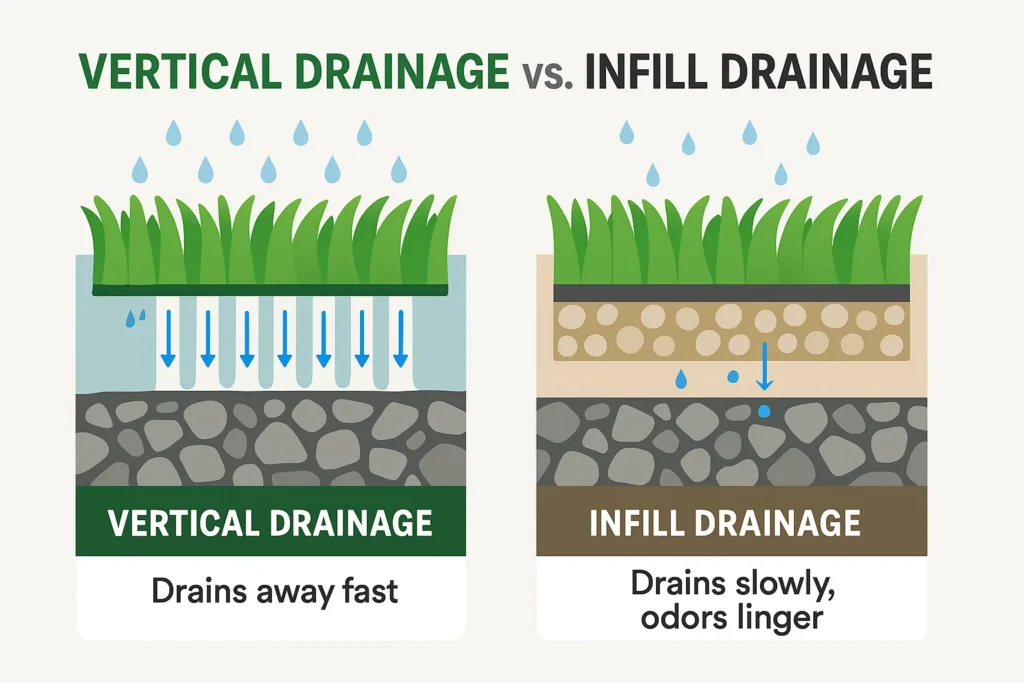
Symptoms of Poor Drainage in a Pet Yard
Not sure if your current turf is doing its job? Poor dog-friendly turf with good drainage should never show these warning signs:
- Turf smells worse after it rains
- Puddles form in the same spots again and again
- Dogs avoid certain areas. It’s often a hidden sign of pet turf water pooling or lingering odours
- Flies hover around the turf or yard
- The turf feels soft or squishy even when dry
- Stains or discoloration show up over time

These symptoms point to deeper problems under the surface, usually infill saturation or compacted bases.
Real-Life Scenarios Where Turf That Drains Well for Dogs Matters
Drainage sounds like a technical detail. But itchanges how your space feels, functions, and smells every day. Consider these real-life examples:
- Urban backyards where there’s no natural slope and no real sun exposure
- Dog daycares where dozens of dogs use the same space daily
- Condo rooftops with artificial turf trays that rely entirely on engineered flow
- Shaded suburban yards where evaporation is slow and puddles linger
In each case, poor drainage means more maintenance, more odor, and less, well, enjoyment.
Turf Maintenance and Drainage Problems with Pet Turf
Yes, maintenance matters. But it only works if your turf drains properly.
- Routine rinsing works but only if drainage is functioning. Learn more about cleaning artificial grass after rainy days.
- Enzyme sprays break down odor but still rely on water flow to flush them through
- With infill turf, cleaning is constant. With AGL, it’s rinse-and-done.
It’s the difference between constant deodorizing and a yard that stays clean with just a rinse.
Why AGL Is Designed Differently
From the ground up, AGL Grass is built for drainage. Here’s why it stands apart:
- Infill-free by design: Nothing to absorb or trap odor
- Quick-drain backing: Water flows straight through
- Slope-aware installs: Every yard is graded to move water away
- All-season tested: Performs in Canadian freeze/thaw cycles and Texas storms
The result? Cleaner turf, dryer paws, and way less work.

Want a Cleaner Yard (and Less Odor)? It Starts with Drainage
Pet turf shouldn’t smell, stain, or stress you out. It should work like real grass, or better.
If your lawn leaves muddy paws and lingering smells, it’s time to fix the drainage.
Explore pet turf systems built to drain fast, stay dry, and keep odors away from your backyard BBQ’s, because great turf starts below the surface, especially when you’re looking for dependable artificial grass drainage for dogs.




